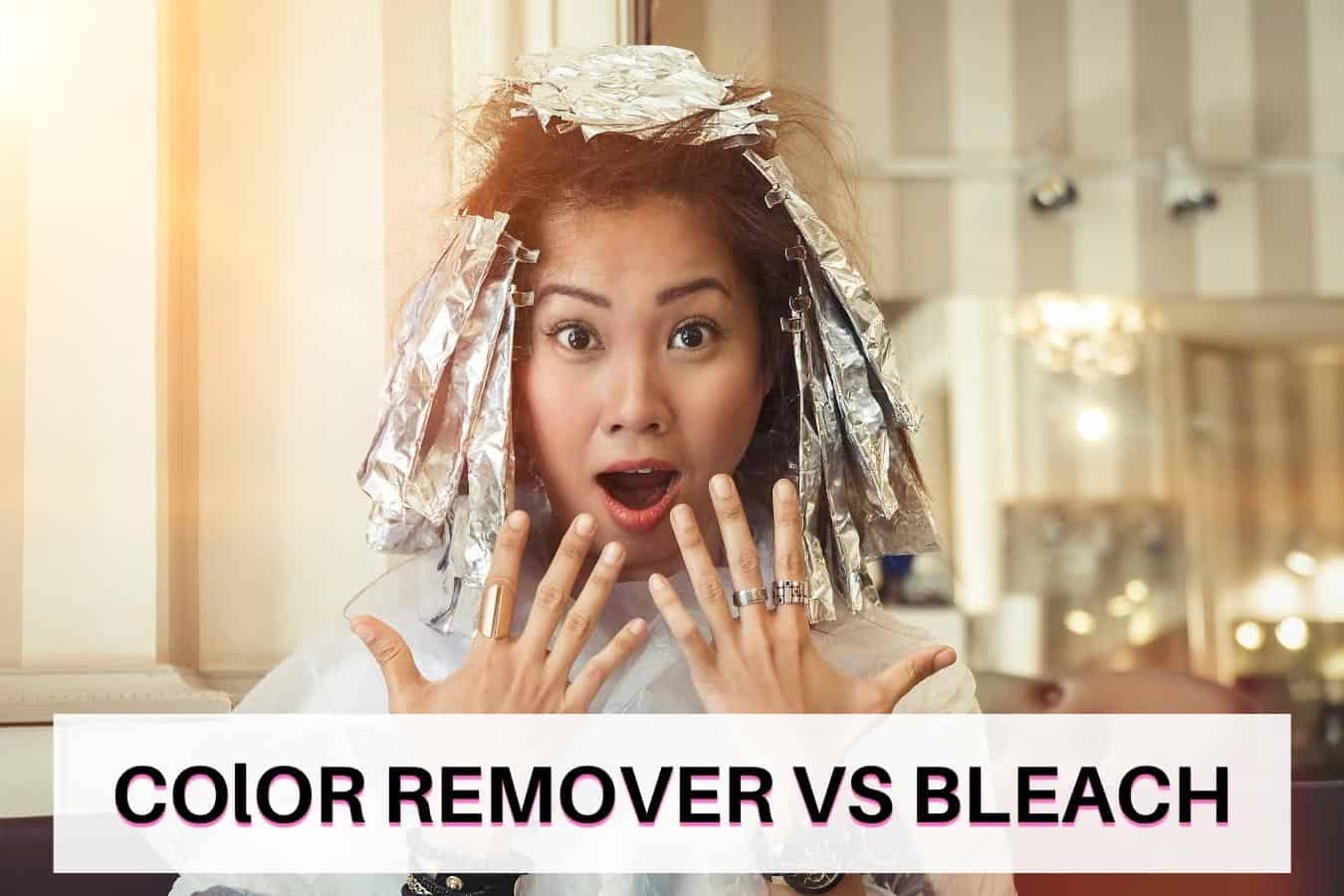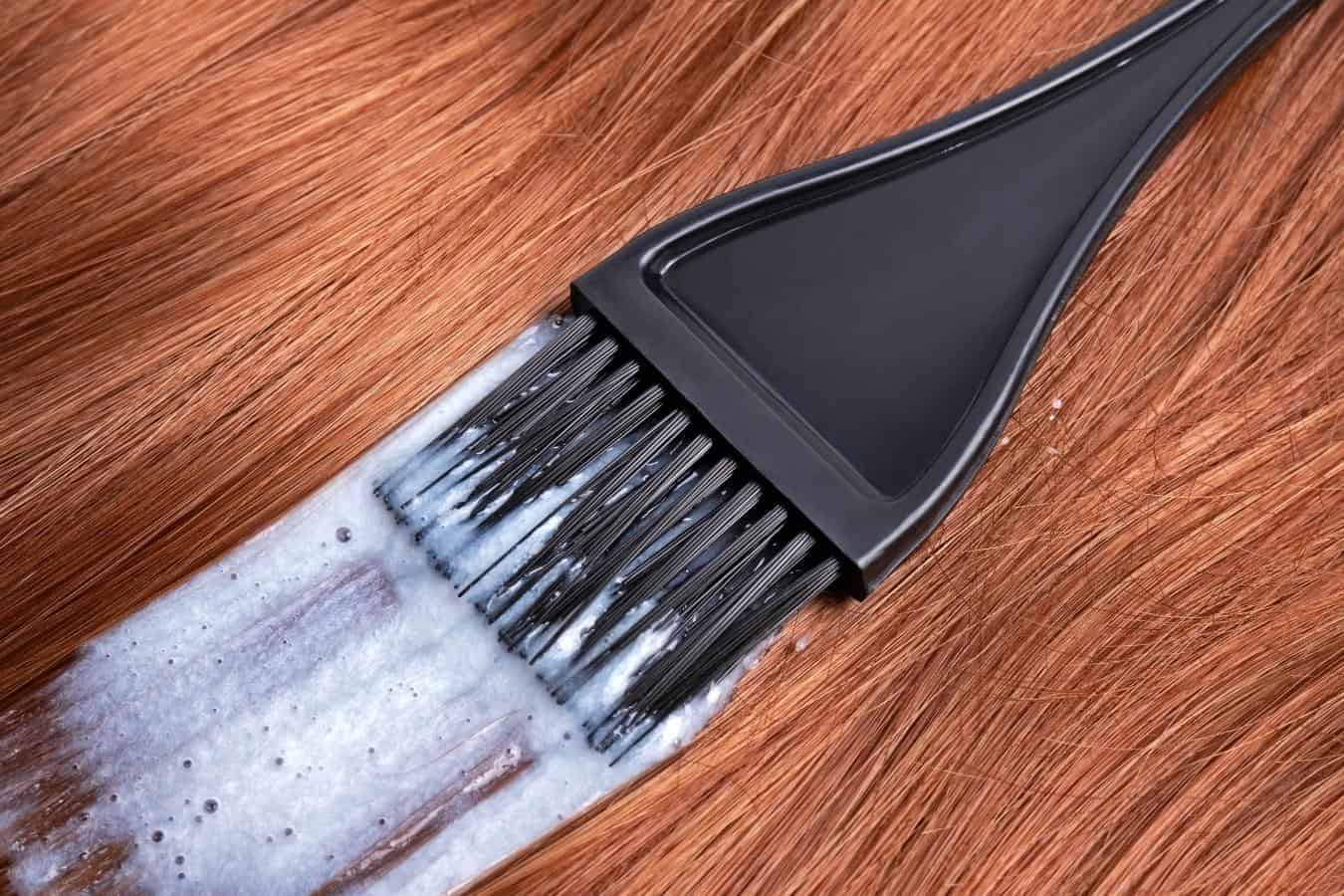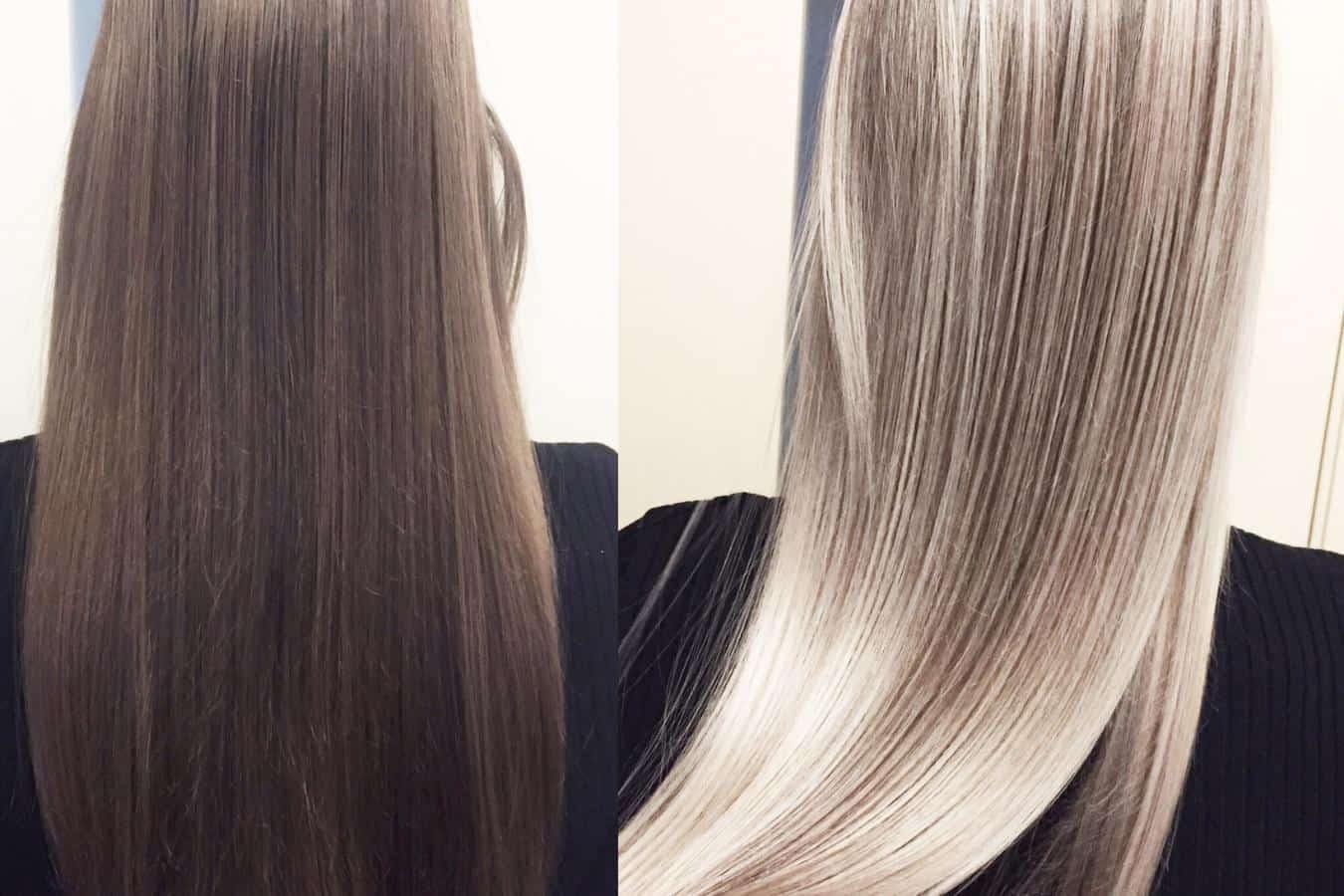If you color your hair on a regular basis, it’s important you understand the difference between color remover and bleach. Although they are often listed as the same thing, color remover and bleach are entirely different products and will have different effects on your hair as a result.

What’s The Difference Between Color Remover And Bleach?
Color remover works by dissolving permanent hair dye from strands, allowing it to be rinsed out for hair to return to its natural color. Bleach will dissolve hair dye and lighten the natural pigmentation of hair.
Although they are often lumped together in the category of hair care products that remove hair dye, color remover and bleach are not the same thing. They also don’t operate in the same way.
Whether color remover or bleach is right for you will depend on what you want from your hair, so it’s important to understand how they differ.
Color remover
As its name suggests, color remover works by penetrating the hair shaft. This allows it to dissolve any color pigment (hair dye) in the hair shaft, which means that this color can then be rinsed out of the hair.
It’s worth knowing that you do have to be diligent when rinsing your hair after using color remover, This will help to remove dye pigmentation from your strands.
If used correctly, color remover can return your hair to its natural color.
It might take a couple of sessions with a color remover to do so, depending on the darkness of your most recent dye, but eventually, your hair will be returned to its natural color.
This is the key difference between color remover and bleach, because bleach strips hair of all of its color, both the dye and your natural melanin.
Color remover is therefore a less intensive, more gentle way of stripping hair dye from your strands compared to bleach.
For this reason, color remover can be used more than once in order to dissolve color build-up in hair, whereas overuse of bleach will seriously damage your strands.
Color remover won’t work on either semi- or demi-permanent dyes, however. It also won’t work on natural dyes like henna.
Bear in mind that if you bleached your hair prior to applying any hair dye, the color remover won’t restore your hair to its natural pigmentation.
Color remover kits for at-home use can be more expensive than at-home bleach treatments.
However, if you are not confident about using bleach, it’s important to go to a salon. This will reduce the risk of damage to your hair.
Factoring all of this in, color remover may therefore be cheaper overall than using bleach – and less risky.
Bleach
Bleach also works by penetrating the hair shaft. However, unlike color remover, bleach will remove all of your natural pigmentation (melanin) from your hair because of its lightening agent.
This lightening agent is typically peroxide or ammonia.
It works by entering the hair shaft, where it bonds and oxidizes with the natural melanin in the hair, thereby stripping hair of its natural color.
This is the main difference between bleach and color remover: color remover will only dissolve hair dye molecules, allowing them to be rinsed out.
Bleach will dissolve both the molecules of hair color and the hair’s natural pigmentation.
This is why bleach can be so damaging and dehydrating for hair if used repeatedly or if applied to hair without following proper procedure.
Bleach, therefore, requires more aftercare when used, and you should be completely confident with using it so as to avoid seriously damaging your hair.
If you have any doubts about using bleach, it’s always better to pay up for a professional instead.
Is Color Remover Better Than Bleach?

Whether color remover is better than bleach depends on what you want from your hair.
If you want to remove the existing hair dye your hair and return your strands to their natural, pre-dye color, then you should use color remover.
Remember that color remover will only work on permanent dye!
Also, if your hair is already very damaged and dry, you should avoid bleach at all costs, as it will only cause more damage.
Color remover is therefore better for inexperienced individuals looking to remove their hair dye, as there’s less risk of damaging hair with its use.
However, if you want to remove the hair color in your hair – either because you’re bored of it or had a bad dye job – and you want to lighten your natural hair color, then you should use bleach.
You should always be confident with using bleach so as to reduce the risk of damage to hair. Be aware that bleach might irritate scalps due to its intense chemical activity.
If you are looking to remove hair color at home, it will be cheaper to use bleach to do so, and won’t require multiple attempts (whereas color remover might need to be applied more than once).
However, misuse of bleach can damage the hair cuticle, resulting in extremely porous, dry, brittle strands.
It’s for this reason that we recommend booking in with a hairstylist if you have any doubts about using bleach. It’s just not worth the risk.
Do You Use Color Remover Or Bleach First?
Remember, whether or not color remover or bleach is better for you depends on whether you’re only looking to dissolve your existing hair dye or if you want to dissolve this dye and lighten your natural hair.
That being said, if you’re looking to remove permanent hair dye from your strands, use color remover first.
It’s a much gentler way of removing hair dye from your hair. However, you might need to apply color remover to your hair more than once – particularly if your hair dye is very dark.
Bleach will remove your hair dye in one go, but will also lighten your natural hair color and is a more damaging process.
If you are dissatisfied with your color remover, you can use bleach to remove the hair dye from your hair.
However, do not use bleach immediately after using color remover. You should wait at least a week (and ideally ten days) between using color remover before applying bleach.
It’s also worth using a deep conditioning treatment on your strands during this in-between period, too, so as to help them recover and prevent the risk of damage from the bleach.
Is Color Remover Bad For Your Hair?

Most color removers don’t contain the chemical agents contained in bleach (ammonia and/or peroxide).
However, some of them do, so you should always check the ingredients before use! It’s because color removers usually don’t contain these chemical agents that they are typically less damaging than bleach.
As such, color remover is usually less damaging than bleach, provided that it is applied according to manufacturer instructions.
That said, color remover is still going to strip your hair of natural oils, so it’s worth nourishing your strands with a deep conditioning treatment after use.
You also still shouldn’t be using color remover regularly. If you like chopping and changing up your hair color, consider using semi-permanent hair dye instead of permanent dye.
Semi-permanent hair dye doesn’t require color remover to be stripped from the hair, so it is less damaging.
Is Bleach Bad For Your Hair?
The process of bleaching can damage your hair. First, an alkaline agent opens up the hair cuticle.
An oxidative agent then penetrates the hair cortex, dissolving your hair’s natural pigmentation (its melanin).
As such, your hair loses its elasticity and can feel less soft. Opening the hair’s cuticle makes it more vulnerable to split ends and subsequent breakage.
Plus, bleach breaks down your hair’s natural fatty acids, dehydrating and weakening hair strands.
Color Remover Vs. Bleach – Pros And Cons
pros
- If used as directed, color remover should not damage your hair
- Color remover doesn’t change the natural color of hair
- Easy to use at home and less risky than bleach for novices
cons
- Color removers tend to have a very strong, sulfurous smell which can take a few days to disappear
- Won’t remove semi- or demi-permanent dyes, or natural dyes
- At-home kits can be more expensive than at-home bleach
- May take a couple of attempts to get the hair dye out of your hair
- You have to be diligent with rinsing out all color remover from your hair
- Ensure that your color remover is bleach-free (not all are) by checking ingredients before purchase
Bleach pros
- Dissolves hair dye and lightens the natural pigmentation of hair
- Works on all types of hair dye
- Will remove hair dye (and lighten hair) in one go – there’s no need for repeat applications
- No sulfurous smell
- At-home kits are cheaper than at-home color removers
Bleach cons
- Can seriously damage hair if used incorrectly, so bleach is only suitable for those who are confident using it
- Can leave hair damaged and dry, and may irritate the scalp
Disclaimer: This site is not intended to provide professional or medical advice. All of the content on LovedByCurls.com is for informational purposes only. All advice should be followed at your own discretion. Ingredients may change at any time so always check the product label before using. Check our full disclaimer policy here.
